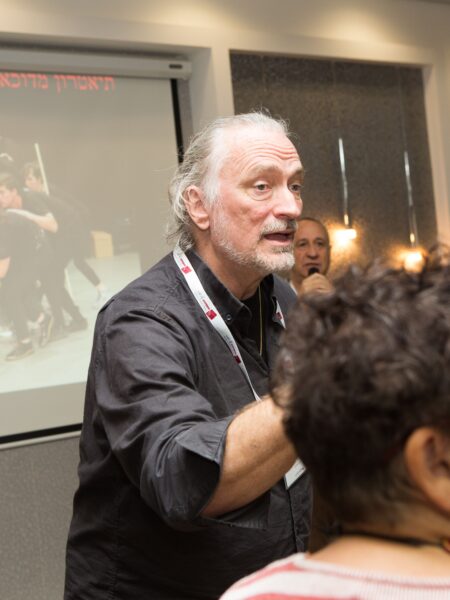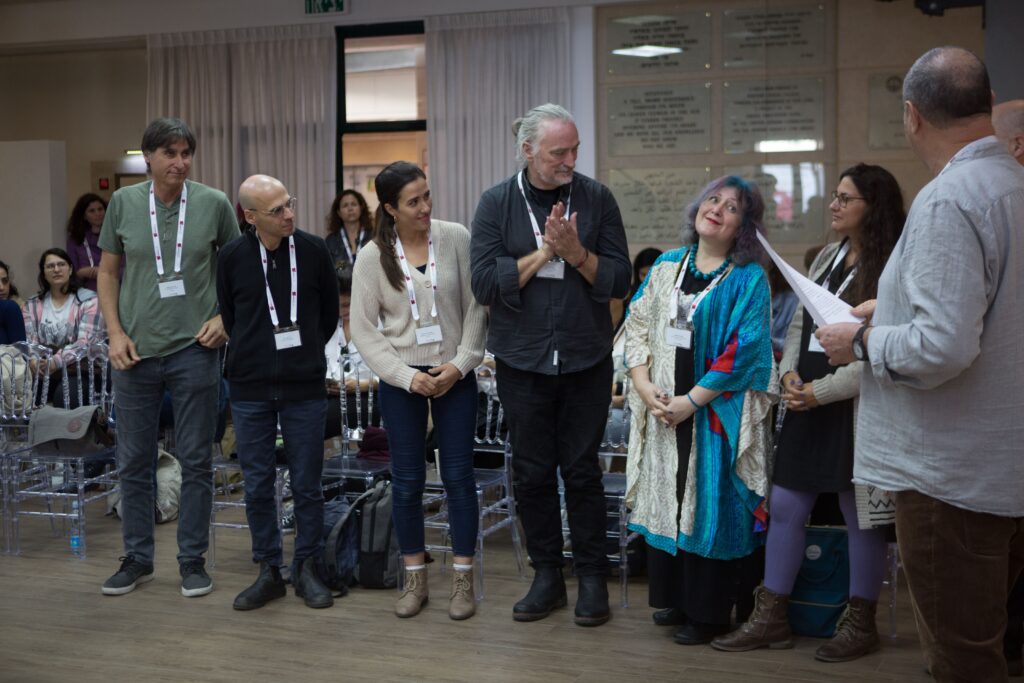
Professor Blair leads a workshop on Theatre of the Oppressed techniques in Israel. Photo courtesy of Brent Blair.
SDA Professor Brent Blair understands that theatre is an art form that democratizes dialogue – and that can change the world. On his recent sabbatical, he traveled to India, Rwanda and Israel to research the power in working with communities to rewrite their narratives – creating space for healing and the possibilities for justice.
Since 1991, Professor Blair, who is the founding director of SDA’s Institute for Theatre & Social Change, has been practicing Theatre of the Oppressed, a form of activist theatre that was first described by Augusto Boal in the 1970s. In this work audience become active members of the performance, acting out parts in plays dealing with real-life scenarios of suffering, political oppression or injustice. The effect can be radical: participants can gain greater empathy, experience healing, or become motivated to make social changes that otherwise they may not have felt so deeply about.
Working with global practitioners, Professor Blair was able to learn new techniques, teach workshops and push the practice forward.
“[Theatre of the Oppressed] is traditionally dedicated to the notion that social transformation is material,” Blair explains. “However, a lot of people I’ve been working with are people of faith.”
Blair points to Rwanda as an example of where faith plays a complex role, both in pain and healing. Many of the perpetrators of the horrific genocide there were people of faith—but the victims of the genocide today are also spiritual, and faith is an important part of their healing.
“There were horrific abuses in the vilest of ways,” Blair said. “But faith is still a really important part of their recovery.”
Blair first traveled to India where he met with Sanjoy Ganguly, artistic director of the Jana Sanskriti Centre for Theatre of the Oppressed, the largest practicing Theatre of the Oppressed company in the world. Blair and Ganguly are currently co-writing a book on the subject. Blair spent six weeks teaching multiple 6-hour workshops, experimenting with new techniques and speaking with the practitioners to understand their experiences. One unusual technique involved spinning around like dervishes, then channeling an urgent message from an ancient ancestor in a made-up language; after which, a partner would translate that message, finding an urgent solution to one of the world’s problems.
“The idea is to get out of the frontal lobe of the brain and into more creative parts to offer outside-the-box solutions you normally wouldn’t think of,” Blair explained.
Blair then traveled to Rwanda, where he worked with people who had been affected by the genocide more than two decades ago. Rwanda is in a unique situation: following the genocide, the president of Rwanda set up courts based on a traditional justice system wherein the maximum sentence for those who participated in the genocide was 25 years in prison. That number is fast approaching, meaning that many of those who participated in the genocide will soon be released back into society.
Professor Blair says that it’s unclear whether either the victims of the genocide or the people who committed the genocidal acts themselves are ready for this mass reentry. He believes that the work he and his colleagues do can aid with the healing.
“I don’t think this is a material problem,” Blair said. “This is a problem of spiritual perception, and the heart and the soul.”
Blair’s final stop on the trip was in Israel, where he worked with both Israelis and Palestinians who had been affected by the conflict there. He worked with Israelis who refused to join military service and were incarcerated, spent the night in Jericho with former Palestinian militants, and worked with the Parents’ Circle, a group of both Israeli and Palestinian parents who have lost children in the conflict.
“The survivors and victims of violence who may have lost family members—we’re trying to give them monologues that are deeply painful, deeply humanizing,” he said. “In this way, we’re still going to advocate for restorative justice programs, but we’re going along a path where we know it’s complicated and the answers are going to be complicated.”

What’s missing is what’s in the middle
The thesis of the sabbatical, according to Blair, was that “we can no longer see these problems as purely material. We see them as material to our disadvantage.” Blair points to the issue of genocide in Rwanda as an example of the complex nature of these problems. It’s no longer feasible to paint a simple picture of perpetrator and victim. Once the Rwandan genocide perpetrators are re-released, the society is going to need to move forward with healing, both for victims of the genocide, for the children whose parents were locked up for perpetrating the genocide, and even for the perpetrators themselves.
“It involves blurring the binary between oppressor and oppressed,” Blair explains. “The intersection between healing and justice.”
Now that he has returned to Los Angeles, Blair has lost no time implementing the new techniques and knowledge from his sabbatical in the classroom. His popular “Performing Policy” class, a collaboration with the USC Price School of Public Policy, brings together dramatic arts students, policy students, and community partners who have experienced the prison system to co-create and perform a play that addresses incarceration as a response to violent crime.
“We’re already talking about trying to find more complex techniques,” Blair said. “We’re going to see how the techniques that I gathered in India, Israel and Rwanda can serve to make our play more complicated and complex.”
For Blair, including the realm of the spiritual in Theatre of the Oppressed is the next step in finding how theatre can help with both healing and social justice.
“What’s missing for me is what’s missing in the middle,” Blair said. “On one side, there’s a lot of theatre for social justice around the world. On the other, there’s theatre for healing. It’s rare to find a mixture of the two—theatre that is both healing and a proponent of social justice.”
That is just what he’s trying to build.